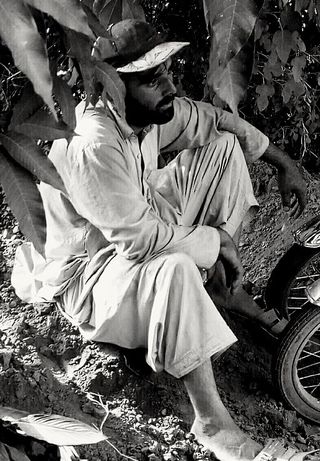Loneliness
Drowning in Loneliness and Fear
How spiritual rituals can be life-preservers.
Posted November 19, 2018

There are people in my life who, when they go away for a few days, leave me anxious. I feel more alone if they are not where they are “supposed to be” in my mind.
My sister and brother-in-law are in New York City this weekend, actually closer to me geographically now than when they are home—but my internal stability needs them to be home. The same goes for my brother and sister-in-law.
A friend who lives five minutes from me was away last weekend at a conference, and I felt unsteady.
Another friend splits her time between two places, and I need to know when she’s going to be here and when she’s going to be at her place in Vermont—not because we see each other all the time; I just feel more secure when she’s here in town.
Emotionally, I need to be able to say, “Help! I need you. Please come.” I know they will, from wherever they are, and my increased anxiety when they aren’t at home is totally irrational. I’m lucky that my fear is controlled by my rational thoughts. I don’t get paranoid. I know that I really am safe.
I know that other people would help me if these people aren’t available, or if I need more than they can offer. The local fire hall is around the corner, and the first responders would be here in an instant if anything happened. The EMTs would take me to the hospital if I got sick or hurt. The police would help if I were in danger. In my experience, friends, colleagues, neighbors and even strangers would be supportive, generous and kind if I had any kind of emergency. Again, I’m lucky--unfortunately, those things are a privilege in our world these days, even though they are basic human needs and moral rights.
Why do I need those select few to be where they are supposed to be? I suppose because in troubling times in the past, they kept me from falling down the well of loneliness, to use Radclyffe Hall’s wonderful phrase for those life experiences when we feel utterly isolated and alone. My experience was not the one Radclyffe Hall depicts in her novel about a lesbian couple in 1917, who lived in a socially-unauthorized relationship. My big experiences at the well of loneliness have been simpler: in my first marriage, the sudden realization that the man I had just married wasn’t going to be there for me; and then in a much happier second marriage, the sudden death of my husband, the loss of my primary person, who had made me feel so secure.
That all happened a while ago, and I’m surprised to feel again the grasping need for certainty that people are where they are supposed to be—namely, near me! But it’s not an uncommon feeling; many of us have it off and on all our lives. That heightened awareness of the danger of loneliness.
I was aware last weekend that depression lurked; it usually draws me toward the well of loneliness. I’ve been waking up at 3:15 every morning, for whatever reason. The dark night of the soul gets really wearing, night after night, as anyone with insomnia knows.
As the week progresses, I realize I am getting closer to the well: I take a friend to the hospital for a hip replacement and end up spending all day in the waiting room outside the cardiology department, where I see and hear many people with major real life-stressors. My friend comes through her surgery with no difficulty and is joking in her room with her brother as I head home in the dark evening. But I’m rattled: feel my own heart beat irregularly, notice all of the arthritis in my joints.
The next day, I hear the details of another friend’s stint in rehab recovering from a knee replacement. Her husband is attentive, helping her get the care she needs in the nursing home. I picture myself there, without anyone.
I visit a friend in the hospital for an as-yet undiagnosed malaise, scary because unknown. The doctors are doing every test under the sun, and some of the blood work is for the great guns, really serious illness. When I leave the hospital, I go home and eat a whole lot of sweets I don’t really want, trying to soothe myself. The high blood sugar that results isn’t really helpful.

I work all week with clients who are coping with cancer, divorce, grief over the suicide of a sibling, loss of vision, lack of money, insufficient caregivers, gaps in memory, inordinate responsibilities, debt, addiction, and plain old loneliness. I’m not aware of feeling depleted by those therapeutic conversations, though as I review and write that list of topics, I do note that there’s a lot of loss, sadness, and isolation implicit in the issues they are sharing with me. There’s also a tremendous amount of resilience, creativity, humor, faith, and love, which keep us going.
One night I dream I am in a shopping mall, and anxious because almost all the stores are dark—out of business. When I wake, I looked up “mall,” in a dream dictionary, and learn, not surprisingly, that malls, markets, and bazaars represent social contact, and that an empty mall is a symbol of loneliness. “Not just empty,” I think. “That mall was dead. I’m not simply lonely, but bereft.” That morning as we exercise side-by-side at the gym, I tell a beloved old friend that he has to stay well.
As the day progresses, I feel like my cats, a currently-needy client, and I myself are making too many demands on me, and then immediately have pangs of guilt and fear that I am doing enough for other people—a not-uncommon response to needing more care myself.
Feeling untethered, lonely and sad, missing the people who used to be primary—my father and mother, my husband—I suddenly remember Debbie Allen, the hospital chaplain I talked with when my mother was dying earlier this year. Among other helpful things, she asked me if I am affiliated with a church or temple. I told her that I had been thinking about starting to attend a particular one, where the ministry focuses on things that matter to me: social justice, the power and challenge of loving one another, the need for quiet contemplation in our busy world. Debbie smiled at me. “Maybe this would be a good time to go,” she said simply.
I’ve been going to church since then. I find it helpful to set aside the time to be present with myself. I renew my faith in the power of love; I regain balance between the pressing concerns of the world and my belief in human potential to be good. I sing, I pray, I occasionally light a candle in a symbolic act of remembrance.
Today I’m joining the church, which feels like a big, important, even necessary act. It’s a testament, and a commitment, to my belief in the power of love in the world, the power that balances the loneliness that sometimes feels like a dark, cold hole in which I might drown.
By taking the time to cultivate the spiritual part of myself—that often-untended dimension in each of us—I have come to see that my security rests in connection, in love. I know that my family and friends are with me, wherever they are. The love between us makes me certain of that.
One of my favorite spiritual songs, written by Henry Richard McFayden almost a hundred years ago, runs through my head. It gives me comfort when I think about death, which is, I know, the fear at the bottom of the well of loneliness. I love the imagery:
The lone, wild bird, in lofty flight, is still with thee, nor leaves thy sight. And I am thine, I rest in thee; Great Spirit, come, and rest in me. The ends of the earth are in thy hand, the sea’s dark deep, and far off land. And I am thine, I rest in thee; Great Spirit, come, and rest in me.





